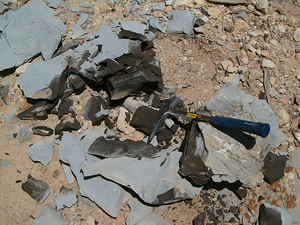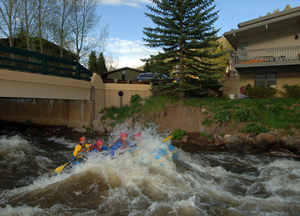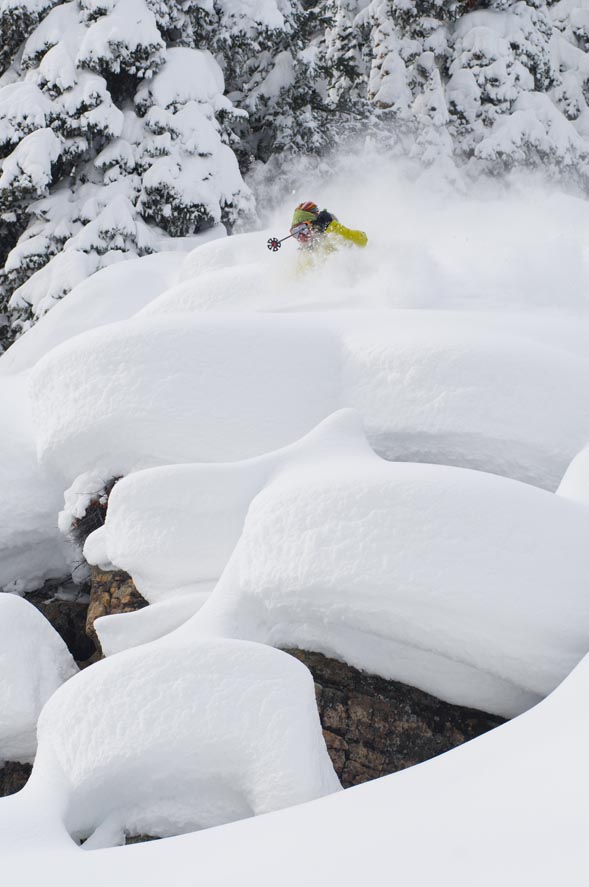
- Coming soon to a rest area near you: Yellowcake uranium, a low-risk form of hazmat
- Garfield County continues to debate resolution on DeGette's FRAC Act
- Can uranium mining, tourism and outdoor recreation coexist in Montrose County?
- Telluride residents rally against proposed uranium mill in Montrose County
- Heavy hitters Udall, Denver Water, USFS get behind Vail biomass power plant concept
- Natural gas drilling to keep moving closer to nuclear blast site near Rulison
- School of Mines professor says gas industry tried to get him fired for controversial comments
- Vail Valley Medical CEO Cassin resigns
- Polar exploration company Quark Expeditions signs on as major sponsor of Vail Valley Foundation
- Shaw Cancer Center in Edwards unveils new PET/CT scanner
- All Real Biz Articles
October 5, 2008 — A Bush administration push to fast-track oil-shale leasing regulations got a big boost last week when a moratorium on those leases was allowed to expire by Congress despite the lack of technology needed to make large-scale oil production from shale commercially viable.
The spending limitation on commercial oil-shale leasing originally proposed by Sen. Ken Salazar and imposed a year ago in an appropriations bill ended Wednesday, but even advocates for the industry admit the move will have no immediate impact on gas prices.
“I don’t see oil shale reducing gas prices tomorrow, but I do think there’s some potential, and it runs into Wyoming and Utah and Colorado,” said Democratic Wyoming state Sen. Bill Vasey, who pushed for an end to the moratorium as the chairman of the board of Americans for American Energy. “I don’t know that we need to lock up any potential energy.”
Vasey remembers the Colorado oil-shale boom and bust of the early 1980s when whole towns sprang up and seemingly disappeared overnight. He said he worked for a coal-mining company in Wyoming at the time that had heavy equipment loaded onto trains and headed for Colorado when the entire oil-shale industry fell through.
But he said times have changed with rising energy prices, the technology is better and the lifting of the moratorium will allow companies to spend more on research and development knowing federal lands will one day be available. He said oil-shale development can be balanced with environmental concerns.
“That’s what bothers me and certainly puts me at odds with two congressmen that I admire, Salazar and [Mark] Udall both. I’m a Democrat and they’re champions,” Vasey said. “But I just think when you say ‘no,’ then there’s no chance to use the technology. We have quite a bit of environmental rules in place, and I’d hope that [oil-shale production] would be done responsibly and following the rules we have.”
Environmentalists have their doubts. Despite reserves estimated at 800 billion barrels of oil in the Green River Basin of Colorado, Wyoming and Utah, no oil company has been able to safely and efficiently squeeze kerogen from the sedimentary rock on a massive scale, then heat the kerogen at extremely high temperatures to extract oil. Also missing is the enormous refining and transportation infrastructure needed to get the oil to market.
“The problem is it’s a land grab,” said Dave Alberswerth, senior energy policy advisor for the Wilderness Society. “For any number of different reasons, it’s imprudent to embark upon a commercial oil-shale leasing program right now.”
Alberswerth said the spending limitation did not in any way block five current Bureau of Land Management research and development projects already leased in Colorado, and that the oil companies themselves own thousands of acres of private lands with billions of barrels of oil trapped in the shale, but still have not figured out how to make the process work financially.
The Bush leasing regulations, Alberswerth said, would establish royalty rates for setting up production at ridiculously low levels and offer little in the way of environmental protections for what is a potentially extremely harmful process if carried out full-scale on public lands. The degradation of water supplies and air quality could be enormous, he said.
“They’re basically 20-year leases for very low payment rates, so it’s a big taxpayer rip-off,” Alberswerth added. “You can also ask the question of whether this is really a good idea at all. Shouldn’t we be embarking upon a major effort in this country to develop clean and renewable resources of energy, not embark upon a big program of figuring out a way to continue to rely on fossil fuel resources?”
Greg Schnacke, president and CEO of Americans for American Energy, said it’s quite possible Wednesday’s move was a “bait and switch” designed to make Democrats look like they’re been proactive on the energy front ahead of the Nov. 4 election only to have a new Congress call for new bans next year.
“My sense is there’s going to be enormous pressure by the national environmental groups for bans, and we’ll see action out of Sen. Salazar and out of Senate and House leadership to deal with these issues again,” Schnacke said, “and whether or not they’re successful depends on the public, which of course sees not developing American energy supplies as a mistake.”
![]() Comment on "Removal of ban on oil-shale leasing sets off environmental alarm bells on Western Slope" using the form below
Comment on "Removal of ban on oil-shale leasing sets off environmental alarm bells on Western Slope" using the form below












